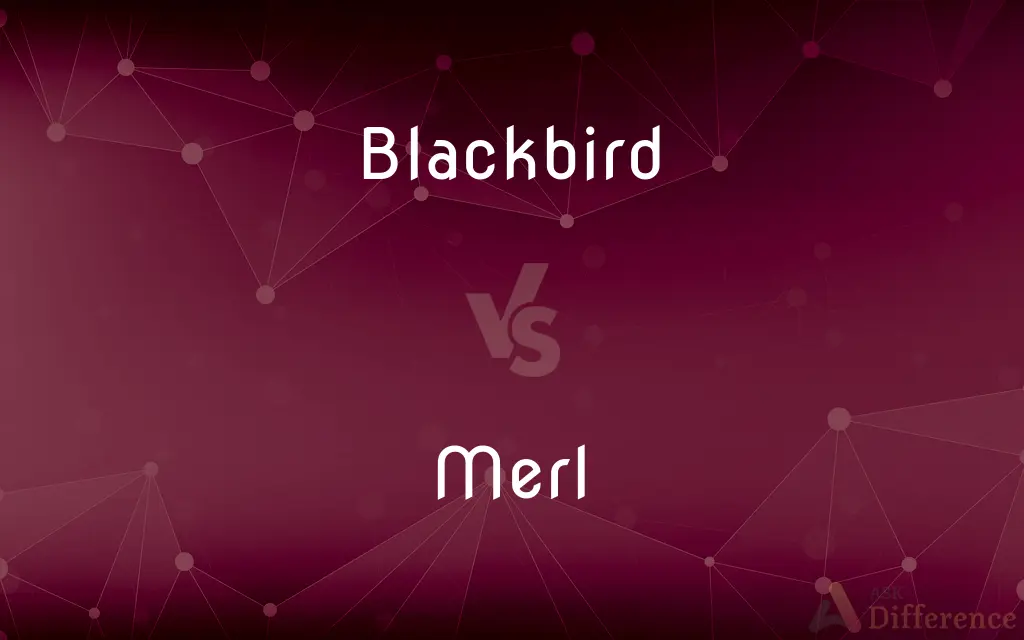Blackbird vs. Merl — What's the Difference?
By Maham Liaqat & Fiza Rafique — Updated on April 17, 2024
Blackbirds are a broad category of medium-sized, singing birds in the thrush family, typically black or dark in color, while merles are a subset featuring distinct songs and often colorful plumage patterns.

Difference Between Blackbird and Merl
Table of Contents
ADVERTISEMENT
Key Differences
Blackbirds encompass a variety of species across several genera, known for their melodious songs and typically dark plumage, part of the thrush family. Whereas, merles refer specifically to certain types of blackbirds like the common blackbird (Turdus merula), characterized by their melodious songs and, in males, a completely black appearance with a yellow beak.
In habitat preferences, blackbirds are highly adaptable, found in various environments from woodlands to gardens and urban areas. On the other hand, merles often prefer more wooded areas where their darker plumage aids in camouflage and their melodious songs can resonate.
Regarding behavior, blackbirds display a wide range of feeding habits, often foraging on the ground for insects and fruits. Whereas merles, particularly the common blackbird, are known for their robust and versatile diet but also share similar foraging behaviors.
The breeding behaviors of blackbirds vary widely, with some species exhibiting territorial behaviors during mating seasons. Conversely, merles like the common blackbird are particularly noted for their strong territorial instinct, often singing from prominent perches to ward off rivals and attract mates.
In cultural significance, blackbirds appear broadly in folklore and music across many cultures, symbolizing everything from change to the mystical. On the other hand, merles, especially in European folklore, are often symbols of melancholy and solitude, reflective of their solitary and melodious singing.
ADVERTISEMENT
Comparison Chart
Family
Turdidae (thrushes)
Turdidae (subset of thrushes)
Color
Predominantly black or dark
Typically black; males are completely black
Habitat
Varied: woodlands, gardens, urban
Prefer woodlands
Behavior
Diverse feeding habits
Similar but highly territorial in breeding
Cultural Significance
Represents change, mystery in folklore
Often symbolizes melancholy in European lore
Compare with Definitions
Blackbird
Typically having dark or black plumage.
The male blackbird flaunts his glossy black feathers in the sun.
Merl
Highly territorial during breeding season.
The merle vigorously defends its nesting area from intruders.
Blackbird
Known for diverse feeding habits.
Blackbirds can be seen foraging for insects on the ground.
Merl
Diet consists mainly of insects and fruits.
The merle was spotted eating berries from the bush.
Blackbird
A songbird of the thrush family, known for its melodious voice.
The blackbird’s early morning song is a delightful start to the day.
Merl
Typically inhabits wooded areas.
Merles blend into the shadows of the trees they prefer.
Blackbird
Found widely in various habitats.
Blackbirds thrive both in remote woodlands and urban gardens.
Merl
Symbolizes solitude and melancholy in folklore.
Folk tales often depict the merle as a solitary singer.
Blackbird
Appears in many cultural references.
Blackbirds are often featured in poetry and songs.
Merl
A type of blackbird known for its completely black male form and melodious song.
The merle’s song pierced the tranquil forest ambiance.
Blackbird
Any of various New World birds of the family Icteridae, such as the grackle or red-winged blackbird, the male of which has black or predominantly black plumage.
Merl
See blackbird.
Blackbird
A Eurasian and African songbird (Turdus merula), the male of which is black with a yellow bill. Also called merle1, ouzel.
Merl
Alternative form of merle(blackbird)
Blackbird
A common true thrush, Turdus merula, found in woods and gardens over much of Eurasia, and introduced elsewhere.
Merl
The European blackbird. See Blackbird.
Blackbird
A variety of New World birds of the family Icteridae (26 species of icterid bird).
Merl
Common black European thrush
Blackbird
A native of the South Pacific islands.
Blackbird
To enslave someone, especially through chicanery or force
Blackbird
In England, a species of thrush (Turdus merula), a singing bird with a fin note; the merle. In America the name is given to several birds, as the Quiscalus versicolor, or crow blackbird; the Agelæus phœniceus, or red-winged blackbird; the cowbird; the rusty grackle, etc. See Redwing.
Blackbird
Among slavers and pirates, a negro or Polynesian.
Blackbird
A native of any of the islands near Queensland; - called also Kanaka.
Blackbird
To engage in the slave trade.
Blackbird
Any bird of the family Icteridae whose male is black or predominantly black
Blackbird
Common black European thrush
Common Curiosities
How do blackbirds and merles differ in their nesting habits?
Blackbirds may vary widely in their nesting habits based on species, but they generally build nests in trees or shrubs. Merles, particularly the common blackbird, often nest in dense bushes or hedgerows to conceal their presence.
What are some common behaviors of blackbirds?
Blackbirds typically exhibit behaviors such as ground foraging for insects and fruits, singing from perches, and in some species, showing territorial aggression during breeding seasons.
What environments are blackbirds adapted to?
Blackbirds are highly adaptable and can thrive in a range of environments, from dense forests to suburban gardens and even city parks.
Are there any notable differences in the vocalizations between blackbirds and merles?
While all blackbirds are known for their singing abilities, merles are particularly noted for their rich, melodious vocalizations, which are often considered more complex and varied.
What are the survival strategies of blackbirds in winter?
Blackbirds, including merles, often change their diet to more fruit and seeds and may form loose flocks to increase their chances of finding food and reducing predation.
How do blackbirds contribute to their ecosystems?
Blackbirds play significant roles in their ecosystems by controlling insect populations, dispersing seeds, and providing food for predators.
What threats do blackbirds and merles face?
Threats include habitat loss, predation by cats and other animals, and in some areas, pesticide use which reduces their food sources.
Do merles migrate like some other blackbird species?
Merles, particularly the common blackbird, can be migratory or sedentary depending on their geographical location. Northern populations are more likely to migrate.
Are blackbirds and merles protected under any conservation laws?
Some species of blackbirds, including merles in certain areas, are protected under local or international conservation laws aimed at preserving wildlife and bird populations.
What are the main differences between blackbirds and merles?
Blackbirds are a broader category including various species, whereas merles are a specific type of blackbird with unique characteristics.
Can merles be found in urban areas like other blackbirds?
Yes, though they prefer woodlands, merles can adapt to urban settings.
How do blackbirds and merles interact with other bird species?
Blackbirds may interact with other species through competition for food and nesting sites, while merles tend to be more solitary, especially during breeding seasons to protect their territory.
What is the typical color of a merle?
Male merles are typically completely black, while females may have lighter or mottled plumage.
Why are merles often associated with melancholy in folklore?
Their solitary and melodious singing, especially of the males, evokes a sense of solitude and melancholy.
How do blackbirds and merles compare in their diet?
Both primarily feed on insects and fruits, but their specific preferences can vary by species and environment.
Share Your Discovery

Previous Comparison
Big vs. Massive
Next Comparison
Complaint vs. QueryAuthor Spotlight
Written by
Maham LiaqatCo-written by
Fiza RafiqueFiza Rafique is a skilled content writer at AskDifference.com, where she meticulously refines and enhances written pieces. Drawing from her vast editorial expertise, Fiza ensures clarity, accuracy, and precision in every article. Passionate about language, she continually seeks to elevate the quality of content for readers worldwide.















































